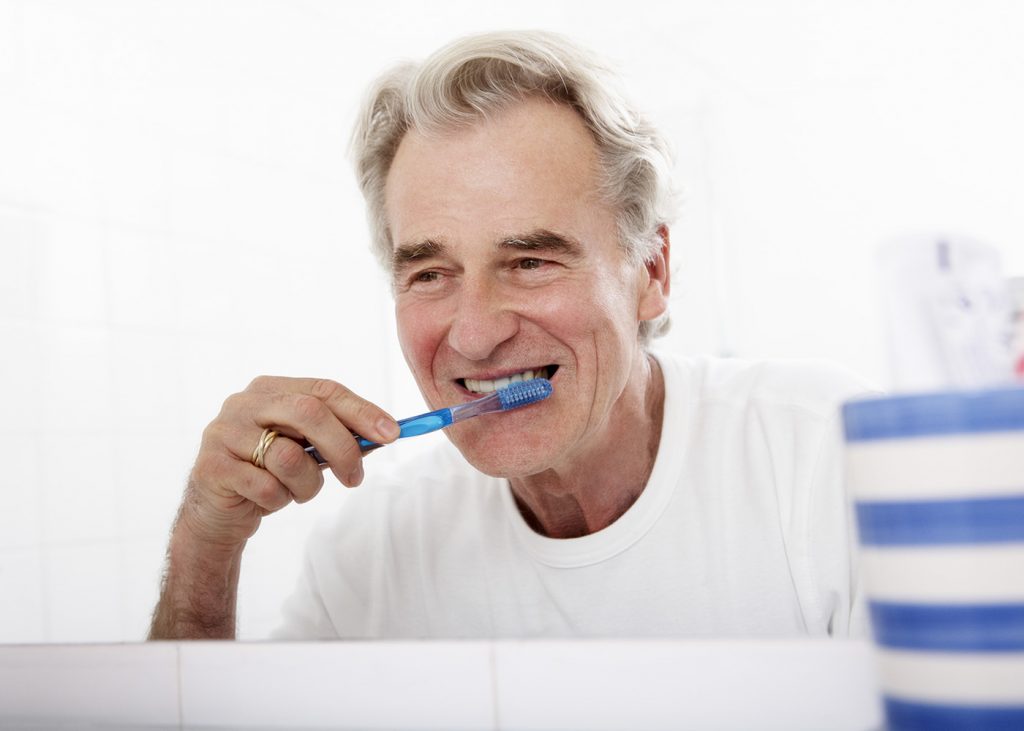Have you ever wondered what is the best toothbrush for dentures? Just like natural teeth, dentures need the same amount of cleaning and care to prevent your mouth from being more susceptible to gum disease, infections, bad breath, and further oral health problems. There are a few types of toothbrushes you can use to clean your dentures, based on the type, materials, and your personal preferences. Here we will review the advantages and best uses for each type of brush.
The Basics: How To Clean Dentures Daily
To help prevent a buildup of this bacteria on your dentures and in your mouth, here’s how to clean your dentures daily:
- Use a soft-bristled regular toothbrush and warm water to brush your dentures
- Rinse your dentures after every meal to help eliminate any leftover food and prevent bacteria from growing
- Soak your dentures in an antibacterial solution for a few hours each day. This is best done overnight when you are sleeping to help remove bacteria and give your gums a rest from wearing them
Regular And Electric Toothbrushes
There are different types of toothbrushes just as there are different types of dentures, and certain types are best paired together. Since dentures are delicate and can be easily damaged, it is recommended that you use a regular soft-bristled toothbrush to clean them, as these are considerably more gentle than electric toothbrushes. All of the quick rotations and vibration that makes an electric toothbrush so effective on your natural teeth would be too harsh on full dentures, but partial dentures are more viable.
To use an electric toothbrush to clean your partial dentures, keep the brush off and use the tip of the head to clean the denture once you remove it. Then brush your natural teeth with the electric toothbrush turned on. Because electric toothbrushes tend to clean natural teeth more efficiently, they are best for this purpose while turned on, but you can use the same brush for double duty to clean your dentures, with the exception of the brush being turned off to protect the dentures’ delicate nature.
Denture Brushes: The Benefits
Your typical soft-bristled toothbrush isn’t the only tool you can use to clean your dentures. There is a denture brush, designed specifically for cleaning dentures that has some key differences and advantages over a regular toothbrush. Let’s take a look:
A denture brush has:
- Two different brush heads
- A flat head for smooth, convex surfaces
- A tapered head to clean hard to reach areas, such as clips and crevasses
- Bristles specifically designed to fit the shape of dentures, that are softer than regular toothbrush bristles, but firm enough to effectively clean without causing abrasion or damage
- An ergonomically designed handle that is easier to grip, control, and less tiring to use so those with limited dexterity can still maintain good oral hygiene
Denture Care with Reno Dental Associates
The qualities of denture brushes are significantly better than regular toothbrushes. Dentures are softer than natural teeth, so they are more easily scratched and damaged by hard, rough bristles. The denture brush is great for full and partial dentures, and you can use an electric or soft-bristled regular toothbrush on your natural teeth.
To learn more about denture options, procedures, and care, contact our talented Nevada doctors and dental associates today for an appointment so you can love your smile again!
